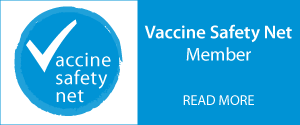This editorial was previously published in Vaccine Safety Quarterly.
Karina Top, MD, MS

Vaccine safety has been my primary research focus for over a decade. I established the Canadian Special Immunization Clinic Network with Drs. Gaston De Serres (Laval University) and Scott Halperin (Dalhousie University) in 2013, which I continue to lead. I have also been a member of the Brighton Collaboration since that time and contributed to the development of several case definitions.
In Fall 2020, recognizing the need for global harmonization of investigation and management of adverse events of special interest (AESIs) that may arise following the implementation of mass COVID-19 vaccination campaigns, Dr. Bob Chen and the Safety Platform for Emergency vACcines (SPEAC) Executive Board convened a brainstorming meeting to discuss international collaboration between specialist immunization clinics that I attended along with Drs. Kathy Edwards and Neal Halsey of the Clinical Immunization Safety Assessment Network. We discussed the need to collect biosamples and the unique opportunity the COVID-19 vaccination campaign presented to investigate causes of AESIs that may arise after vaccine implementation. In December 2020, we held our first meeting of what came to be known as the International Network of Special Immunization Services (INSIS) hosted by SPEAC. The meeting was attended by representatives from clinical vaccine safety networks in the US (CISA, Drs. Edwards, Halsey), Australia (Dr. Nigel Crawford), Italy, Global Vaccine Data Network (Dr. Steve Black), and leading vaccine immunologists and systems biologists from Mayo Clinic (Dr. Greg Poland), Precision Vaccines Program, Boston Children’s Hospital, (Drs. Ofer Levy, Al Ozonoff), University of Washington (Dr Sonali Kochhar) and the Canadian Pharmacogenomics Network for Drug Safety (Dr. Bruce Carleton). There was strong interest in leveraging the unique opportunity presented by COVID-19 vaccination programs to address gaps in responses to previous vaccine safety signals through applying an “adversomics” approach to understand why and how AESIs developed and who was at risk. Though biosampling and biobanking of patients with AESIs had been attempted in the past with mixed success, it was recognized that such challenges could be overcome through international collaboration to identify and investigate sufficient numbers of well-phenotyped cases and a harmonized approach to data and sample collection.
INSIS grew from there, with regular meetings starting in January 2021 to discuss emerging vaccine safety signals with leading experts in the conditions of interest (e.g., allergist-immunologists, hematologists). We developed harmonized approaches to the investigation and management of these conditions, a central database, and protocol for data and sample collection for downstream multi-OMICs analysis. An initial focus was on anaphylaxis post-vaccination which arose as a signal by January 2021, followed by thrombosis with thrombocytopenia syndrome (TTS), and later myocarditis and pericarditis. We received support from SPEAC and the Coalition for Epidemic Preparedness Innovations (CEPI) for the concept of an international vaccine safety network to investigate underlying mechanisms and biomarker risk factors for AESIs. We began collaborating on a funding proposal to support INSIS multi-OMICs analysis of myocarditis, pericarditis and TTS. In 2022, I was awarded a Canadian Institutes of Health Research-CEPI Leadership Award in Vaccine Research to support enhancing capacity for AESI investigation and harmonized data and sample collection in low- and middle-income countries (LMICs). Through the Global Vaccine Data Network, INSIS began a collaboration with Drs. Clare Cutland, Sana Mahtab and Kimberley Gutu at the University of the Witwatersrand African Leadership in Vaccinology Expertise (ALIVE) network and Wits Vaccine and Infectious Disease Analytics (VIDA) Research Unit. INSIS has sought to expand its membership through its website, publications, and presentations to stakeholders and at international conferences, as well as through outreach to researchers publishing on myocarditis, TTS and other AESIs.
Efforts over the past year have focused on finalizing a longer-term funding agreement with CEPI which was signed recently with the University of Alberta. This funding will support multi-OMICs analysis of samples from cases with myocarditis, pericarditis and TTS following COVID-19 vaccination versus controls to uncover biomarker risk factors and underlying mechanisms of these events. Funding will also support genomics analysis to identify genetic markers of these conditions through a collaboration between the Global Vaccine Data Network and INSIS. For the past several months, INSIS has been working to identify collaborators with cohorts of well-phenotyped cases with biobanked samples from around the world and prioritize OMICs assays to ensure the most rigorous approach, informed by the current state of the evidence.
INSIS continues to grow with over 70 members including researchers, representatives of SPEAC and the Brighton Collaboration, WHO and other public health organizations, vaccine developers, vaccine safety experts, and specialist clinicians. INSIS hosts monthly meetings with guest presentations by leading experts in a range of AESIs reported with COVID-19 vaccination. As COVID-19 vaccination programs mature and the vaccine safety community’s focus has begun to shift to other vaccines, the network is now expanding its focus to potential safety signals with novel vaccines (e.g., RSV, Lassa fever) and childhood vaccinations, as well as developing protocols to respond to a new AESI ‘X’.
INSIS welcomes expressions of interest from new members who can contact the network via the INSIS Program Manager, Sara Moradipoor: moradipo@ualberta.ca or via info@insisvaccine.org. INSIS is pleased to be participating in the 4th Biennial International Precision Vaccines Congress in Rome, Italy, October 5-6, 2023. We encourage researchers and other stakeholders interested in vaccine adversomics to attend this world-class conference.



